Prospering in Senegal, or migrating: The two sides of the coin for young people in a country in turmoil
With 75% of the population under 35 years of age, the nation grapples with social and political instability, shortcomings in the educational system and precarious work conditions, which drive many to seek opportunities elsewhere. Those who stay face the daunting task of forging ahead in an environment fraught with obstacles
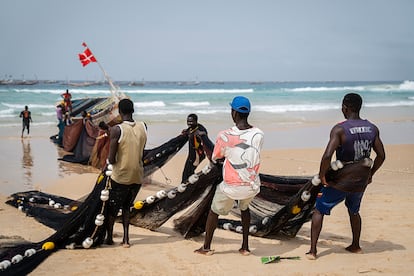
Senegal is going through its most difficult hours. In the last three years of political and social instability, which have been marked by protests and restrictions on freedoms, tens of thousands of young people have taken to the sea in canoes to reach the Canary Islands or flown to Central America to pursue the American dream. Many others, however, stay, fighting for change or just trying to get ahead. In the midst of enormous uncertainty about the future, studying or working has become a challenge. The presence of young people is overwhelming: three out of every four Senegalese are under 35 years old. They are increasingly connected to the world, with enormous expectations, but at the same time disappointed with their country. “Searching, guided by the survival instinct,” says Boubacar Seye, migration researcher and president of the NGO Horizons Without Borders.
At the Cefer training center in Dakar, dozens of boys and girls in blue suits descend the stairs at the same time. They have just finished classes and are now taking a moment to eat a sandwich and check their messages on their phones. The screens flicker in their hands. Souleymane Wane, elegant and sober despite being only 24 years old, speaks with surprising maturity: “My dream was to study medicine, but I didn’t get the grades, so I ended up in science and technology,” he explains. In his first year of college, a cycle of riots that continues to this day began in Dakar, triggered by a power struggle between the government and the opposition ahead of this year’s elections, leading to a nine-month closure of the Cheikh Anta Diop University. “One day the police came in and we got locked in. They were throwing tear gas inside,” he recalls.
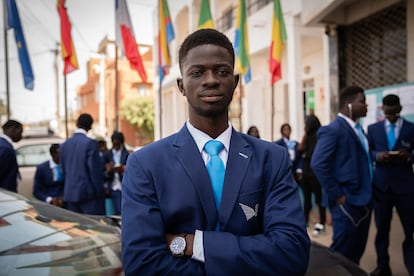
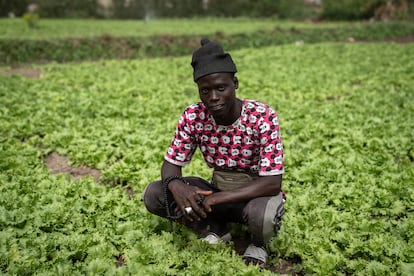

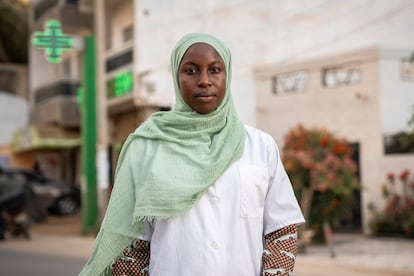
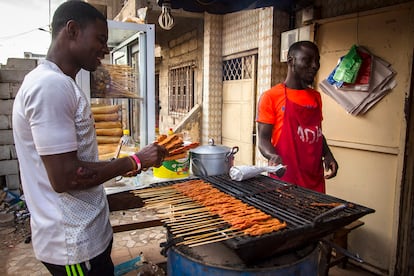

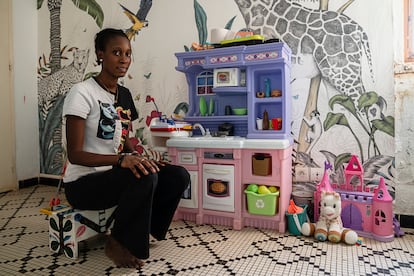
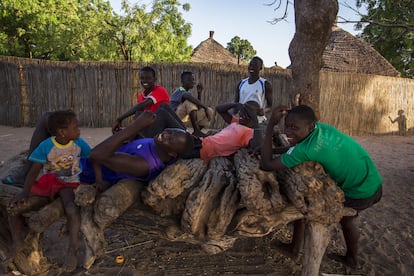
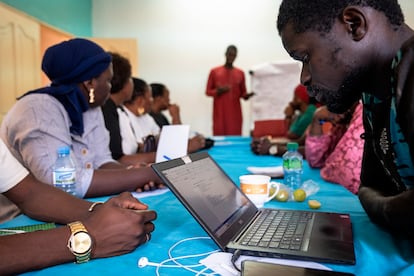
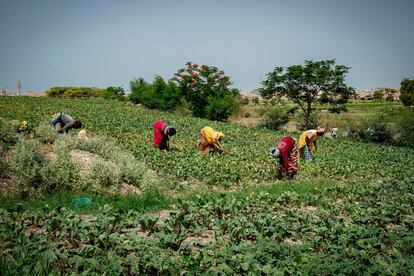
In order not to miss the year, Wane enrolled in engineering at Cefer, one of the many private centers that have proliferated in Senegal to make up for the shortcomings and the constant problems of public education. However, that requires money. To pay the approximately $1,400 per year that it costs, he received help from the Dakar Mayor’s Office, although his family still had to pay half of it. Many Senegalese cannot afford it: “We students are in a very difficult situation,” says the young man, who was born in a village in Fatick and, like many of his classmates, is a fervent follower of the imprisoned opposition leader Ousmane Sonko, who has managed to attract the young people, eager for change. “If you gave visas to all these people right now,” he says, as he gestures to the rest of the students, “they would all leave.” Then he adds: “Of course we have dreams, but how are we going to achieve them here? We need a new Senegal where we can succeed without having to leave.”
In the past three years, young people have played a central role in the aforementioned protests, and many have paid a high price. Approximately 50 people have died as a result of the police response, with the latest four deaths, from gunshot wounds, occurring this February. Hundreds have been arrested and have remained in pretrial detention for eight months or longer without being tried. The riots began in 2021 following Sonko’s first judicial indictment (which his supporters have always described as political persecution) and continue to this day, with the postponement of the elections decreed by President Macky Sall on February 3rd. It is the most combative and rebellious face of the young people, who want to usher in a change of cycle in their country, who want to vote, who need answers to their frustration and concerns.

Mariama Diallo is 27 years old and works as a nurse. After completing her internship, today she works caring for elderly people. For a 10-hour shift, she earns approximately $8. To supplement her meager income, she provides therapeutic massages at home for about $25. “There are no decent jobs. I presented my resume in many places and got nothing,” she explains. A few decades ago, many young women used to be pushed into marriage as soon as they reached little more than adolescence, but Senegalese society has changed. “I want to continue my career, my studies, do a master’s in public health. When you get married and have children, you can’t get ahead,” she says. “All that can come later.”
The possibility of seeking new horizons has crossed her mind. Some of her colleagues have migrated to Canada and today earn up to $38 per hour, an astronomical figure compared to the meager incomes Diallo can aspire to in Senegal. “Life here is difficult. Nothing guarantees you’ll have a decent job under normal conditions,” she adds. For now, she lives with a friend in Dakar, one of the most expensive cities in West Africa, comparable to many European urban agglomerations, where the average monthly income of tens of thousands of people who work informally hovers around $117. Survival is an obstacle course.
“It is not a question of poverty, but of expectations,” says researcher Boubacar Seye. “There are many people who pay €4,000 [around $4,300] to go to Nicaragua and from there to the United States. We have an international, connected youth with great personal and social aspirations. But what they experience on a daily basis is food insecurity, health hardships, lack of work. Development policies have failed miserably. There is a fear of tomorrow,” states the expert. Meanwhile, on the other side, “Europe stands as a fortress where legal access is impossible, the borders become cemeteries and the money they send to African countries for supposed migration management disappears who knows where,” says Seye.
A sort of couch, a double mattress, a table with a sound system and a chair. This is the modest furniture in Tivaouane Peulh’s room, on the outskirts of Dakar, which he shares with his friend Ibrahima Kane, 30 years old, while he waits to move into a proper apartment. A graduate in accounting and law, he is unemployed and makes ends meet by writing reports for others. When he was younger, he applied for up to three visas to study in Europe: in France, Germany and Spain. He even had pre-registration at two universities, as well as paid accommodation. But he was not successful. Obsessed with the idea of leaving, before he turned 20 he left Senegal and was in Morocco, Algeria, Libya, Tunisia and Egypt. He jumped the Ceuta fence twice and one time managed to reach Bulgaria through the Turkish border. However, he was deported after every attempt.
“The visa issue is scandalous. The consulates have outsourced the granting of appointments to private companies, and an entire business has emerged around it. You try to access the service through the computer and in a couple of minutes all the appointments for the month are already blocked. Then someone from the company calls and offers it to you, but only if you pay €500 or €600 [approximately $550 or $650]. It’s all a mafia,” says Kane, who, with all the accumulated experience, has become an activist advocating for migrants’ rights. In his opinion, the fact that this happens with the knowledge of the consulates is part of the same process of outsourcing of borders, devised to curb the right to human mobility. “The legal route is currently inaccessible for 99% of the population,” he explains.

Still, not everyone wants to leave. A soft haze extends across the farm fields of Lendeng, in Rufisque, about 15 miles from the Senegalese capital. A few feet from a toll highway, a farmers’ cooperative makes a miracle possible: they produce lettuce, parsley, turnips and beets, right where the city ends. Mamadou Faye, 26, gets up early every morning to take care of his small plot. “There is always something to do: planting, weeding, watering. I don’t have a single day of rest,” he says. He lives with three other boys, a cart driver and two farmers like him, in a modest room for which they pay about $43 a month. “I share the benefits of the land with the owner; he takes one half and I take the other.”
Faye, who was born in a village in Mbour, could not finish high school, but still speaks more than acceptable French. He does not complain. He smiles. Changing his life does not cross his mind. “I’m happy. I have work and I can take care of my parents by sending them something. The land gives me security. I don’t see myself on a boat at sea. That’s very dangerous. When I see all those young people who are leaving I think that I have a lot here. For me, the most important things are my religion and my work,” he explains. How about having a family, having children? Sure, “that will come,” he replies with an unfading smile.

Young Fatiakh Diangar, 25, also loves nature. Perhaps because she was born in Diofior, a small town in Sine Saloum, she decided to study environment and sustainable development and wrote her thesis about the threats facing mangroves. Like so many other students, after three years of university in Kaolack she made the leap to Dakar to pursue training in sustainable ecosystem management, which costs her about $1,100 a year. To finance it, she works as a babysitter. “My family doesn’t have the means and I really like kids, so it’s a good solution,” she explains. She lives with her older sister and cannot shake the idea of returning to her town one day.
“Dakar is noise, pollution, everything is uncomfortable. In Diofior there is a peace and quiet that can’t be found here,” she says. Still, she dreams of finishing her training in Europe or America. “I have tried through Campus France and in Canada, but it is very complicated. There I can finish my degree faster and with a better level. In Senegal everything is problems and delays.” Her idea would be to work in an environmental organization or in a development project after finishing her studies, but in her native region. To leave, certainly, but also to return someday. That is the dream of many.
Sign up for our weekly newsletter to get more English-language news coverage from EL PAÍS USA Edition
Tu suscripción se está usando en otro dispositivo
¿Quieres añadir otro usuario a tu suscripción?
Si continúas leyendo en este dispositivo, no se podrá leer en el otro.
FlechaTu suscripción se está usando en otro dispositivo y solo puedes acceder a EL PAÍS desde un dispositivo a la vez.
Si quieres compartir tu cuenta, cambia tu suscripción a la modalidad Premium, así podrás añadir otro usuario. Cada uno accederá con su propia cuenta de email, lo que os permitirá personalizar vuestra experiencia en EL PAÍS.
¿Tienes una suscripción de empresa? Accede aquí para contratar más cuentas.
En el caso de no saber quién está usando tu cuenta, te recomendamos cambiar tu contraseña aquí.
Si decides continuar compartiendo tu cuenta, este mensaje se mostrará en tu dispositivo y en el de la otra persona que está usando tu cuenta de forma indefinida, afectando a tu experiencia de lectura. Puedes consultar aquí los términos y condiciones de la suscripción digital.









































